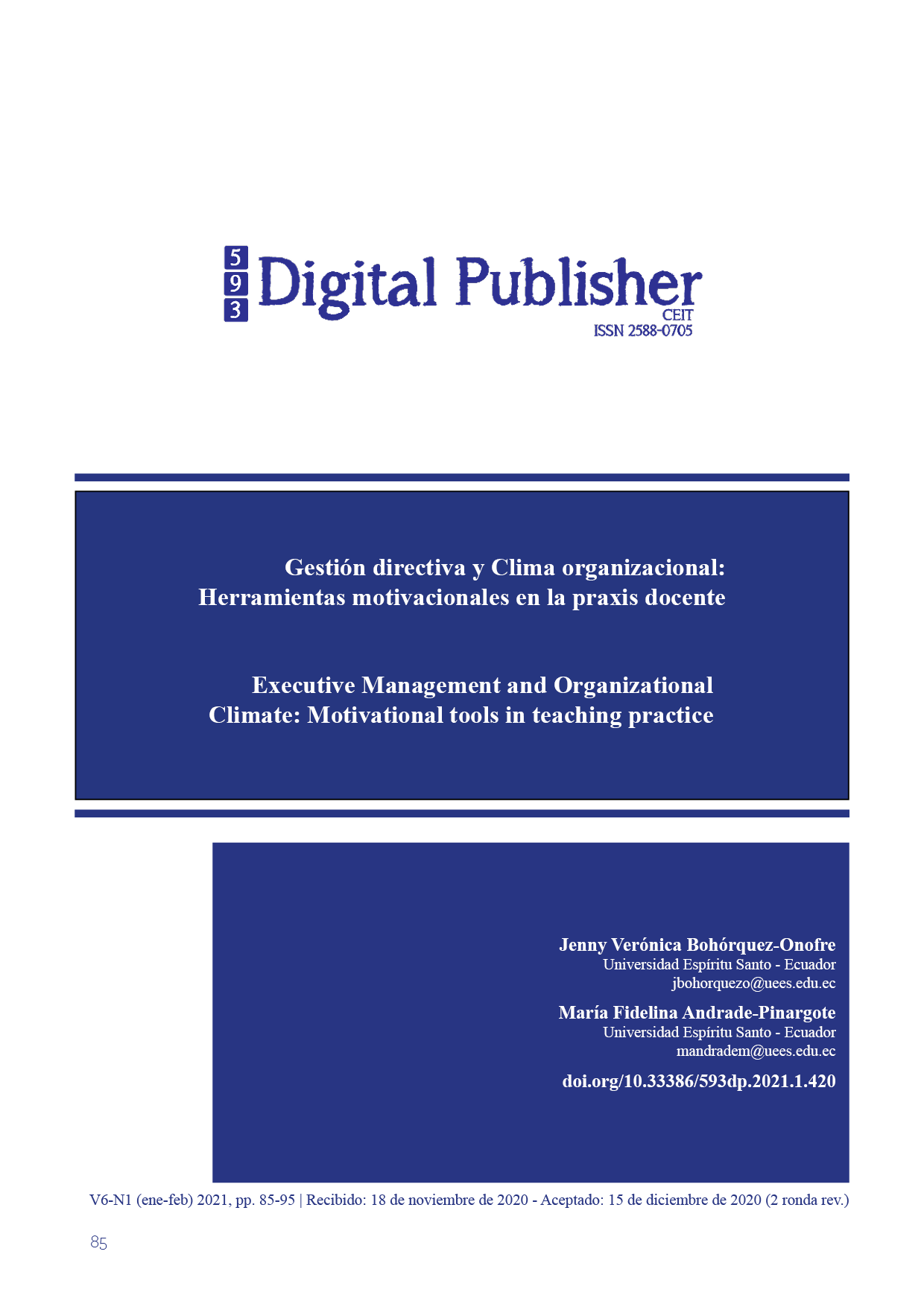Executive Management and Organizational Climate: Motivational tools in teaching practice
Main Article Content
Abstract
The research attempts to argue that a relevant, assertive and motivational practice of management promotes an organizational climate that favors the integral development of students and with them the educational quality. The teacher is recognized as the first responsible for these achievements who must feel motivation to perform better each day, being essential the assertive action of the manager who must promote a positive organizational climate. In this sense, it is established as a general objective to contribute to the strengthening of management through a system motivational strategy that led to the development of a climate positive organizational among the actors of the educational community The Simón Bolívar Mixed Fiscal School of the city of Guayaquil. The study applied methods such as the Historical-Logic, the Structural-Functional Systemic, and the Mixed that allowed through quantitative surveys applied to 15 teachers on the campus which contained twenty items related to management and organizational climate. Among the main results it was determined that between 80% and 87% of teachers say that a favorable organizational climate improves the personal, professional and labor relations of the members of the educational community, for which there must be an induction plan, The Institutional Educational Project must be built on a participatory basis and there must be a function manual and communication plan. Where it is concluded that the importance of management in the quality of teaching practice could be established, this has a positive or negative influence on the motivation of teachers and thus on the promotion of an effective organizational climate for pedagogical practice.
Downloads
Article Details

This work is licensed under a Creative Commons Attribution-NonCommercial-ShareAlike 4.0 International License.
1. Derechos de autor
Las obras que se publican en 593 Digital Publisher CEIT están sujetas a los siguientes términos:
1.1. 593 Digital Publisher CEIT, conserva los derechos patrimoniales (copyright) de las obras publicadas, favorece y permite la reutilización de las mismas bajo la licencia Licencia Creative Commons 4.0 de Reconocimiento-NoComercial-CompartirIgual 4.0, por lo cual se pueden copiar, usar, difundir, transmitir y exponer públicamente, siempre que:
1.1.a. Se cite la autoría y fuente original de su publicación (revista, editorial, URL).
1.1.b. No se usen para fines comerciales u onerosos.
1.1.c. Se mencione la existencia y especificaciones de esta licencia de uso.
References
Arias, F. (2012). El proyecto de investigación (Cuarta Edición ed.). Caracas: Editorial Epistema, C:A. doi:ISBN: 980-07-8529-9
Crespo, T. (2007). Respuestas a 16 preguntas sobre el empleo de expertos en la investigación pedagógica (Primera Edición ed.). Lima, Perú: San Marcos Anibal Jesús Paredes Galván. doi:ISBN: 978-9972-34-835-8
Herrera, S., & Tobón, S. (2017). El director escolar desde el enfoque socioformativo. Estudio documental mediante la cartografía conceptual. Revista de Pedagogía, 38(102), 164 - 194. doi:ISSN: 0798-9792
Iglesias, A., & Sánchez, Z. (2015). Generalidades del clima organizacional. Revista MediSur, 13(3), 10. doi:ISSN 1727-897X
Mendoza, M., & Ortiz, C. (2006). El Liderazgo Transformacional, Dimensiones e Impacto en la Cultura Organizacional y Eficacia de las Empresas. Revistas de la Facultad de Ciencias Económicas, XIV(1), 118 - 134. doi:ISSN: 0121-6805
Prieto, Y., & Velasco, F. (2017). El Asesor Educativo como principal orientador en la comunidad educativa. (E. 71, Ed.) Revista LUZ, XVI(3), 109-126. doi:ISSN 1814-151
Sagredo, E., & Castello, A. (2019). Gestión directiva y clima organizacional en la educación de personas adultas en Chile. Revista Actualidades Investigativas en Educación, 19(2), 1 - 25. doi:ISSN 1409-4703. http://dx.doi.org/10.15517/aie.v19i2.36895.
Segredo, A., García, A., & León, P. (2017). Desarrollo organizacional, cultura organizacional y clima organizacional. Una aproximación conceptual. Revista INFODIR Información para Directivos de la Salud, 24, 86 - 99. doi:ISSN 1996-3521 (RPNS: 2097)
Segredo, A., García, A., López, P., León, P., & Perdomo, I. (2015). Enfoque sistémico del clima organizacional y su aplicación en salud pública. Revista Cubana de Salud Pública, 41(1), 10. doi: ISSN 1561-3127
Sepúlveda, L., & Valdebenito, M. (2019). Gestión directiva en establecimientos de educación media técnico profesional: desafíos para el liderazgo. Revista de Calidad en la eduicación(51), 10. doi:http://dx.doi.org/10.31619/caledu.n51.666
Torres, T. (2016). Reflexiones en torno a la Lógica en la investigación científica: Un acercamiento al desarrollo de la creatividad y al proceso de enseñanza-aprendizaje. Deutschlan, España: Editorial Académica Española. doi:ISBN-13 : 978-3841755735
Villamil, G. (2016). Liderazgo educativo en el siglo XXI,desde la perspectiva del emprendimiento sostenible. Revista de la Escuela de Administración de Negocios(81), 111 - 128. doi: http://dx.doi.org/10.21158/01208160.n81.2016.1562



